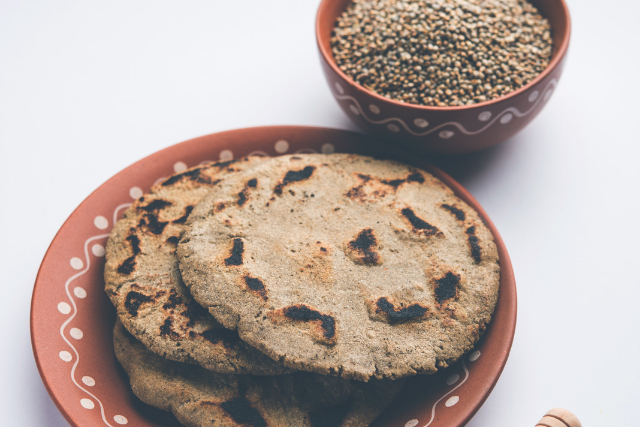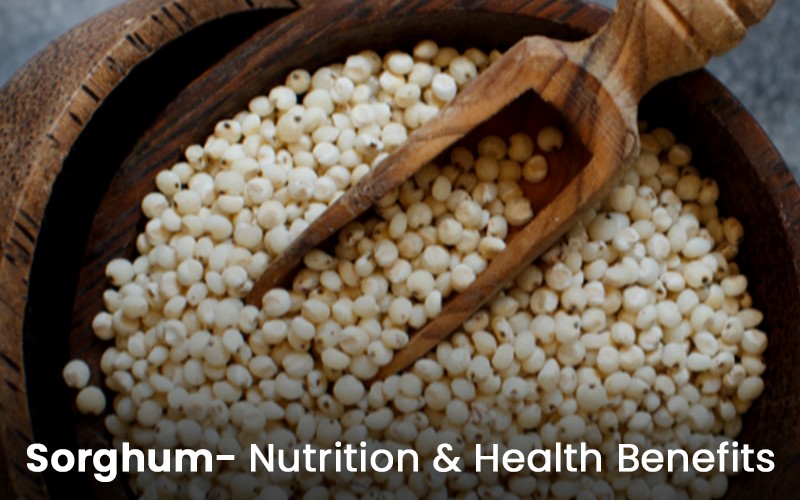Why you should be Adding Sorghum (Jowar) To Your Diet?
If this is the first time you are hearing of a grain called sorghum or Jowar, you are in for a ride with this blog! Though sorghum has only recently gained a buzz in modern healthcare communities and the western world, it has existed as a staple grain in Indian diets for years. With recent research and innovation in trying to find gluten-free options of fibre and nutrition, Sorghum seems to give you a perfect alternative for a grain that is healthy, safe, affordable, and filling for you to eat. Is this exciting to hear for you? Read on to know much more!
What is Sorghum?

“Sorghum” widely refers to a group of 25 plant species that belong to the grass family of Poaceae. You may have heard that this is part of the millet family. Historically, evidence suggests that it is Africa in which this grain was first grown and used. During the Indus Valley Civilisation, some of it got traded to India.
Sorghum is one of the most manufactured wholegrains in the world and is often used in western countries in utilities such as brooms, animal feed, and fuel. The 25 species of sorghum are found largely in areas of Australia, Africa, and Asia. Among these “sorghum bicolour” is used most popularly. What species ends up being utilized as something of relevance to human beings depends on what it is being used for (food, fuel, or fodder). However, its nutritional value is getting increasingly relevant in the past few years, and that is the part we will be speaking about the most.
Why Add Sorghum To Your Diet?
If we talk about the use of Jowar in India, there is sufficient evidence that suggests that Jowar and millets, in general, used to serve as a staple food in various parts of India and its culture within small villages. As the world progressed, more refined grains such as wheat and rice took over.
Cut to the present, millets and sorghum itself has started to make a comeback in people’s diets. More and more talks about the amazing nutritional value of this discarded grain are being talked about, and people are opting for Sorghum to be part of their balanced diet. What are these nutritional values that have been creating such a buzz? Let’s discuss all the health benefits of Sorghum to determine this:
Sorghum is a gluten-free grain.

Gluten refers to a set of proteins that are largely found in grains such as wheat. It is this protein that gives these grains a smooth texture when transformed to flour and combined with water. Ever notice how easy it is to make a dough out of gehu ka aata? Gluten is the ingredient to thank for wheat’s glue-like consistency.
Gluten has been found over the years to have some bad effects on one’s health. Though not everyone faces adverse effects from its consumption, its overconsumption can trigger gluten sensitivity. This may lead to digestive problems. Others may have a gluten intolerance problem, celiac disease, or wheat allergy. These issues are what lead to people attempting to find gluten-free alternatives for their staple diets.
This is where the increasing use of Jowar comes in. Sorghum is gluten-free and can therefore spare those with a bad relationship with gluten from problems such as stomach pain, IBS, and bloating. It acts as a nutritious replacement for wheat or maida in goods such as bread, cookies, cakes, etc.
High In Fibre
Fibre is something that is found in plants, vegetables, and the like and is responsible for optimal human health. It is essential for human beings to consume it in good quantities, however, many times people fall short on it. Whole grains such as wheat and rice are sources of a great amount of fibre – but sorghum is a grain that is especially rich in fibre.
Not only does the high intake of fibre help in regulating your stools, but it slows digestion which is why you are unlikely to feel too hungry after having enough fibre. Consuming enough dietary fibre has been repeatedly associated with reduced bad cholesterol too! This means that having more sources of fibre (which would be sorghum in this case) can help you promote a healthy heart and body.
Excellent Protein Source For Vegetarians and Vegans
If you are someone who follows fitness secrets frequently, this shouldn’t come as a surprise to you. Protein plays a significant role in building our muscles and increasing our overall body strength. However, the richest sources of proteins for human beings tend to come from eggs or meat.
It can often be difficult to get to an optimal protein intake for vegans and vegetarians. This is where Jowar comes in handy! Every 100 grams of sorghum has over 11 grams of protein, making it a perfect addition to reaching your required protein intake. As a matter of fact, many protein bars use sorghum as the base grain for their product. Other typical grains such as wheat and rice do not provide you with such a high amount of protein.
Can Aid Weight Loss

Sorghum is high in both fibre and protein, making it a good choice for a healthy diet. Protein is required to build strength and muscles (which increases your metabolism). Fibre plays a good role in regulating your digestion and has a distinct quality of satisfying your hunger pangs. In other words, protein ensures your energy & strength, while fibre makes you less hungry. This is perfect if you are looking to add something to your diet that will aid your weight loss!
Additionally, Sorghum is filled with complex carbohydrates that take a while to digest which means you are not going to feel any hunger pangs for hours after consuming enough sorghum. You are also likely to feel more energetic.
Good For Your Bone Health
Sorghum is very rich in minerals and vitamins. This includes the high nutritional value of iron, magnesium, phosphorus, and zinc in the wholegrain. A certain mineral called magnesium is something the grain is especially rich in. Magnesium is the mineral required by your body to absorb calcium into the bones, therefore, having a magnesium-rich diet is often associated with better bone density.
Magnesium is also said to have a soothing quality which fights the ill-effects of stress, promotes better sleep, and healthy digestion.
Rich In Minerals And Vitamins
Whether we’re talking about iron, copper, zinc, magnesium, phosphorus, or potassium – sorghum is filled with an abundance of minerals. These minerals are essential in maintaining a healthy body by regulating hydration as well as blood circulation. For example, iron is the mineral our body uses to produce red blood cells. Similarly, potassium plays an important role in regulating the sodium content in one’s body.
Jowar does not fall short in its vitamin content either! It is abundant in Vitamin B1, B2, B5, and B6 – all of which are essential for cell regeneration.
Since these minerals strengthen your bones, improve your blood circulation, and strengthen your digestive system, you are likely to feel much more energetic after you consume the grain!
Antioxidant and Anti-Inflammatory
Sorghum has several anti-oxidant and anti-inflammatory agents. For example, magnesium, which is a mineral the grain is very rich in is associated with dealing with stress and inflammation. This may help you feel much calmer after having a bowl of sorghum. Furthermore, antioxidants such as flavonoids, tannins, and much more eliminate cancer-causing free radicals in your body and aid your immune system in fighting against disease.
As an antioxidant and anti-inflammatory, Jowar might even help you improve your skin health.
May Help In Dealing With Diabetes

You might have heard that carbs aren’t great for those with diabetes. While this is partially true, sorghum is actually a complex carbohydrate! The distinct quality of complex carbohydrates is that they take a long time for your body to break down. What does this mean? Lowered blood sugar levels in your body! In fact, sorghum syrup (in limited quantities) is often recommended to diabetics as an alternative sweetener as it is less harmful than regular sugar coming out of sugarcanes.
Ways In Which You Can Add Sorghum To Your Diet

Sorghum is a rich nutritious grain that already makes it great in itself, but a special characteristic of the wholegrain is how versatile it is and how many things you can use it for! It stands out in this area and this is why it would only be appropriate if not necessary to speak of all the different ways you can add Jowar into your diet.
As a Substitute to Rice
Rice is a staple food in most Indian households. Luckily, it is fairly easy to steam sorghum just like one steams rice to use it as a substitute for white rice. Sorghum has a higher fibre & protein content and is gluten-free, which gives it advantages over regular rice. Whether you want to switch up your everyday dal chawal or make a nuanced version of poha, sorghum’s pearled versions are likely to work great.
As Flour
It is not that common to use flour made entirely of sorghum. However, it is fairly easy to add equal parts gehu ka aata and jowar ka aata to make chapatis that are much richer in fibre and protein than regular ones. They are also likely to be more filling and tasty with a unique texture.
This technique also works if you’re a baking enthusiast! Simply mix all-purpose flour and sorghum flour in an equal ratio and you will have fibre and nutrient rich baked goods in no time.
Sorghum Syrup
Not many people know this but sorghum can be used as a sweetener just like sugarcane is. In fact, it used to be used as a sweetener in south India for generations before regular sugar took over. Sorghum syrup is similar in consistency to molasses (which are made of sugarcane) and many claim it is much sweeter! Along with this, some research has suggested that it might be a better alternative to other sweeteners due to its nutritional qualities. However, it is sugar nonetheless – so watch how much you consume it as too much is never good for anyone.
Pop some sorghum!
Much like pop-corn, sorghum is also sold in markets to be popped. When heated at a high temperature, sorghum pops just like popcorn and makes for a gluten-free and high fibre snack for you to eat while you watch a movie!
Additionally, many variations of sorghum are used as thickeners and sweeteners in various gluten-free recipes. If you look through the internet, you’re likely to find hundreds! We would definitely recommend acquiring a taste for sorghum as it is healthier than regular wholegrains.
Final Word
Sorghum is a healthy wholegrain suitable to consume for most people. It has high nutritional value and serves as a gluten-free substitute to most grains & cereals. In India, Sorghum is known as Jowar and has been used in some traditional recipes for generations. Not only is it high in protein and fibre, but it is also a grain that is sustainable and uses minimal water for its production. The health benefits of Sorghum range from better heart health to effective digestion and its versatile uses only leave you in even more awe.
With the recent shift and tendency to go back to one’s roots, the current time is as best as any to switch to Sorghum as the grain of your choice. We hope this blog did justice to your curiosity regarding Jowar and you are ready to add this wonderful grain to your staple diet right away!




